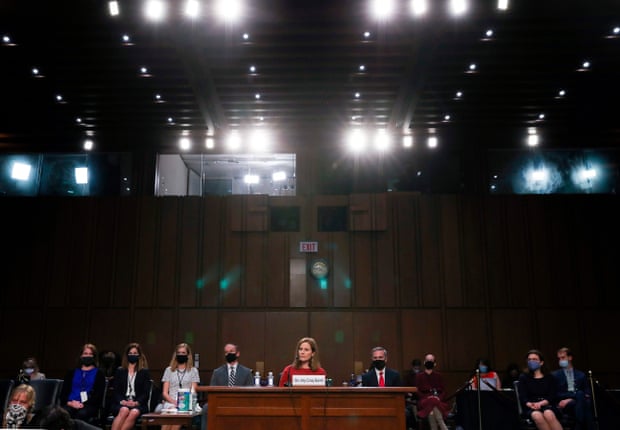Daniel Strauss
@danielstrauss4
On the second day of hearings before the Senate judiciary committee, Democrats pressed supreme court nominee Amy Coney Barrett on healthcare, election law and abortion rights – and met with little success.
Donald Trump’s third nominee for the highest court dodged questions on how she might rule on a challenge to the Affordable Care Act (ACA); if she would recuse herself from any lawsuit about the presidential election; and whether she would vote to overturn the landmark 1973 ruling Roe v Wade, which made abortion legal.
In an exchange with the Democratic Delaware senator Chris Coons, Barrett said: “I am not here on a mission to destroy the Affordable Care Act. I’m just here to apply the law and adhere to the rule of law.”
Multiple Democratic senators pressed Barrett on whether she would recuse herself from a possible case about the outcome of the 2020 election. The Connecticut senator Richard Blumenthal said he was “disappointed” in Barrett’s refusal to commit to a position. He added: “It would be a dagger at the heart of the court and our democracy if this election is decided by the court rather than the American voters.”
Barrett argued that she was not a pundit, citing remarks by Justice Elena Kagan and the late Ruth Bader Ginsburg in saying that outside of reviewing a specific case, it was not her place to offer a position.
“No hints, no previews, no forecasts,” Barrett quoted Ginsburg as saying, after the California senator Dianne Feinstein questioned her about how she might rule in any case challenging the legality of abortion.
Barrett is a devout Catholic whose previous statements and affiliations have been closely examined by Democrats and the media. Trump has said overturning Roe v Wade would be “possible” with Barrett on the court.
When she was asked about a newspaper ad she signed criticizing Roe v Wade, first reported by the Guardian, Barrett said she had “no recollection” of it and stressed she had nothing to hide.
At another point in Tuesday’s hearing, Barrett cited Kagan in saying she would not give “a thumbs up or thumbs down” on any hypothetical ruling.
Most of the questioning from Democrats centered on the ACA, known popularly as Obamacare, and how a ruling by the high court overturning the law would take away healthcare from millions of Americans. A hearing is due a week after election day. Democrats see protecting the ACA as a productive electoral tactic, having focused on it in the 2018 midterms, when they took back the House.
Barrett said she was not hostile to the ACA, or indeed abortion or gay rights, another area worrying progressives as the court seems set to tilt to a 6-3 conservative majority. Barrett said she was simply focused on upholding the law.
“I am not hostile to the ACA,” Barrett said. “I apply the law, I follow the law. You make the policy.”
Asked about gay rights, Barrett said: “I would not discriminate on the basis of sexual preference.”
Her choice of words conspicuously suggested that to her, sexuality is a choice. Amid scrutiny of Barrett’s past, meanwhile, it has been reported that she was a trustee at a school whose handbook included stated opposition to same-sex marriage
Republican senators also questioned Barrett on healthcare, the Iowa senator Chuck Grassley asking if she had been asked during the nomination process if she supported overturning the ACA.
“Absolutely not,” Barrett said. “I was never asked and if I had been that would’ve been a short conversation.”
Barrett said it was “just not true” that she wanted to strike down protections for Americans with pre-existing conditions.
Asked if she thought same-sex marriage should be a crime, she said the ruling in Obergefell v Hodges, in 2015, made it the law of the land.
Asked if she would recuse herself on any lawsuit over the outcome of the 2020 election, however, Barrett declined to commit. Instead she said: “I have made no commitment to anyone – not in the Senate, not in the White House – on how I would decide a case.”
It was the first of two sessions of questioning, after which outside witnesses will be called. Tuesday’s opening exchanges produced a mere continuation of Barrett’s seemingly serene journey into Ginsburg’s seat.
Barrett in addition to serving as an appellate judge is also a professor for the University of Notre Dame. Almost 100 of Barrett’s colleagues in a letter urged her to hold off on the confirmation process until after the presidential election in November.
The letter pointed out the “rushed nature” of events, adding that it “may effectively deprive the American people of a voice in selecting the next supreme court justice”.
“You are not, of course, responsible for the anti-democratic machinations driving your nomination,” the letter added.
Trump and Republicans are eager to move quickly. The president has said he wants to see Barrett confirmed before election day, which is in three weeks’ time, suggesting that this is in part because he hopes she will rule in his favor if a challenge to the election result reaches the highest court.
In a conference call with reporters, Senate Democrats fretted about their chances of stopping Barrett.
“The fact of the matter is this nominee is extreme,” the Connecticut senator Richard Blumenthal said. “Her views are outliers.
“I think we are going to demonstrate today and tomorrow what’s at stake and how extreme and far right this nominee is.”
He conceded that Democrats had no “magic” tool to block Barrett. They would, he said, use every procedural tool they have but “the politics are difficult here. Republicans are practically boasting that they have the votes.”
Blumenthal said Democrats were “ultimately making our case to the American people”, to make them realize the impact Barrett’s nomination was likely to have.
https://www.theguardian.com/us-news/2020/oct/13/amy-coney-barrett-dodges-abortion-healthcare-election-law-questions-hearing


No comments:
Post a Comment